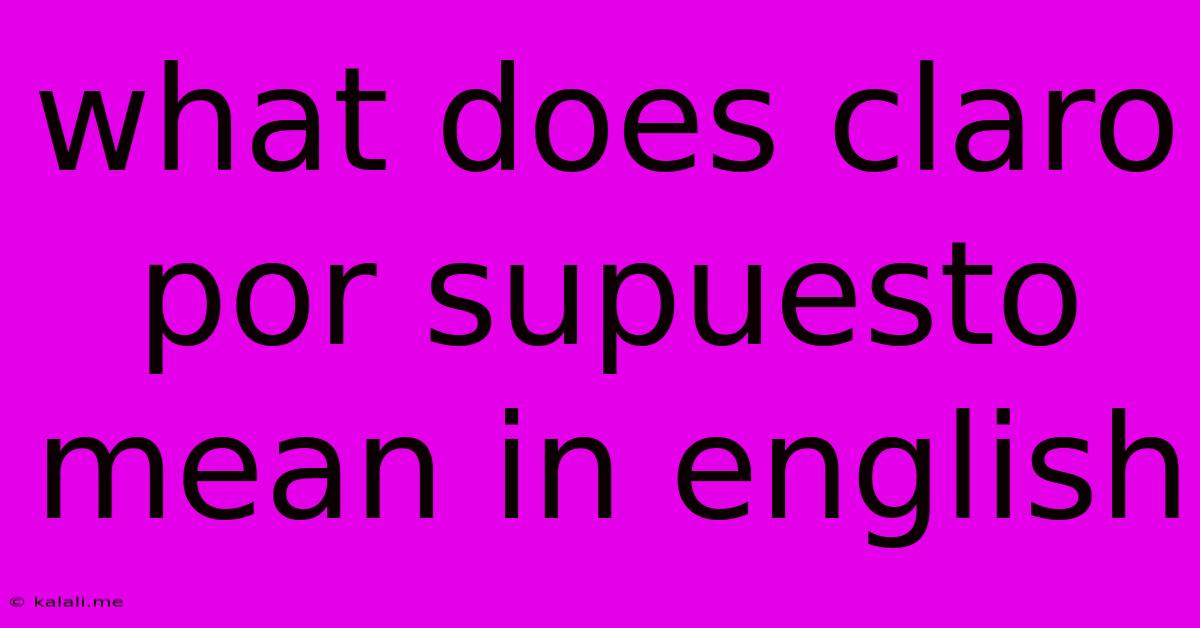What Does Claro Por Supuesto Mean In English
Kalali
Jun 01, 2025 · 3 min read

Table of Contents
What Does "Claro que sí" and "Claro por supuesto" Mean in English? A Deep Dive into Spanish Affirmations
So, you've encountered the Spanish phrases "claro que sí" and "claro por supuesto," and you're wondering what they mean in English. These common expressions convey enthusiastic agreement and are much more than simple "yes." This article will delve into their nuances, providing you with a complete understanding of their usage and helping you sound more natural when speaking Spanish.
Meta Description: Learn the precise English translations of the Spanish phrases "claro que sí" and "claro por supuesto," understanding their nuances and how to use them naturally in conversation.
"Claro que sí" and "claro por supuesto" both translate to "of course" or "certainly" in English. However, the level of enthusiasm and formality differs slightly. Let's break down each phrase:
Understanding "Claro que sí"
- Literal Translation: "Clear that yes."
- Meaning: This phrase expresses a confident and enthusiastic agreement. It's a more informal and vibrant way of saying "yes" than a simple "sí." It implies a certain level of joy or eagerness in agreeing to the request or statement.
- Usage: Use "claro que sí" in casual conversations with friends and family. It's perfect for situations where you want to show your excitement or willingness.
- Examples:
- "¿Quieres ir al cine?" (Do you want to go to the cinema?)
- "Claro que sí!" (Of course!)
- "¿Me ayudas con esto?" (Will you help me with this?)
- "Claro que sí, ¡con mucho gusto!" (Of course, with pleasure!)
Understanding "Claro por supuesto"
- Literal Translation: "Clear by supposition/naturally."
- Meaning: This phrase conveys a more formal and emphatic agreement. It emphasizes the obviousness or naturalness of the affirmative response. It suggests that the question or request was almost expected.
- Usage: While still informal enough for everyday conversation, "claro por supuesto" is slightly more formal than "claro que sí." It's appropriate for conversations with colleagues, acquaintances, or in slightly more formal settings.
- Examples:
- "¿Puedes enviarme el informe antes del viernes?" (Can you send me the report before Friday?)
- "Claro por supuesto, ya lo estoy preparando." (Of course, I'm already preparing it.)
- "¿Te importa si uso tu bolígrafo?" (Do you mind if I use your pen?)
- "Claro por supuesto, adelante." (Of course, go ahead.)
Key Differences and When to Use Each Phrase
The main difference lies in the level of formality and the implied enthusiasm. "Claro que sí" is more energetic and informal, while "claro por supuesto" is slightly more formal and emphasizes the obviousness of the agreement.
Think of it this way:
- Claro que sí: Expresses enthusiastic agreement in casual settings. It's the equivalent of a cheerful "Absolutely!" or "You bet!"
- Claro por supuesto: Expresses a more formal and matter-of-fact agreement, almost suggesting the request was expected or self-evident. It's closer to a polite and confident "Certainly" or "Indeed."
Mastering these nuances will help you sound more natural and fluent in Spanish. Remember to consider your audience and the context of the conversation when choosing between "claro que sí" and "claro por supuesto." Both are excellent choices to convey a positive and enthusiastic "yes" in Spanish!
Latest Posts
Latest Posts
-
Well Pump Runs But No Water
Jun 02, 2025
-
How To Replace This In A Sentence
Jun 02, 2025
-
Were John The Baptist And Jesus Cousins
Jun 02, 2025
-
Dealer Has 1 11 You Have 13
Jun 02, 2025
-
Bash How To Remove Env Variable
Jun 02, 2025
Related Post
Thank you for visiting our website which covers about What Does Claro Por Supuesto Mean In English . We hope the information provided has been useful to you. Feel free to contact us if you have any questions or need further assistance. See you next time and don't miss to bookmark.